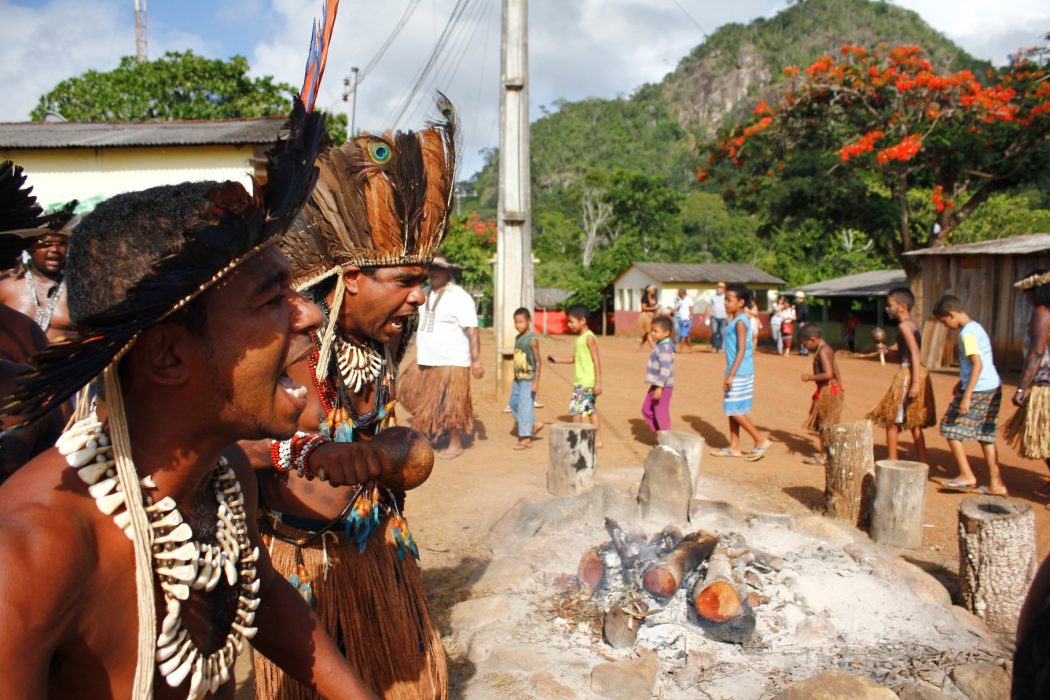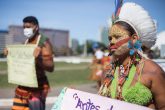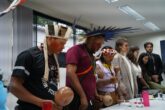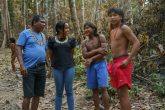Tupinambá people from Olivença reaffirms resistance to Bolsonaro government’s measures
Through a letter to the national and international entities, first-contact people of the country assures they will not leave their territory

Tupinambá people from Olivença. Photo by Renato Santana
Leaders of the Serra do Padeiro Village, in the Tupinambá de Olivença Indigenous Land, wrote a letter reaffirming they will not give up the fight for their territory, whose demarcation was suspended in 2016. The text brings a report about the history of the people since the arrival of the colonizers until the present days. In the letter, they ask the bodies of the Brazilian government and the international entities to take the necessary measures for the preservation of indigenous rights.
“We are the first people of this country, and we will continue to occupy our territory, regardless of the new president’s decisions”, affirm the leaders.
The indigenous also alert the propositions of the Bolsonaro government are a death decree to various ethnicities. “We want assurance from these authorities that all of us, after being killed, will be buried at the foot of the mountain. We will not accept burial in any place other than where we are murdered, within our own territory, as we will never accept to leave”.
“You have nowhere to take us because we have never been from any place other than this one. Know this: no one has ever governed, nor will ever govern the Tupinambá from Serra do Padeiro”.
The Tupinambá from Serra do Padeiro wish for the letter to be as propagated as possible, so the entities that defend their rights can be alerted and take action. It is available in Portuguese, English and French.
Read the full letter below or click here to access it in PDF:
Serra do Padeiro, 19 January 2019.
To His Excellency, Mr. José Antonio Dias Toffoli Minister of Justice of Brazil
To Her Excellency, Mrs. Raquel Dodge General Prosecutor of Brazil
To His Excellency, Mr. Eunício Oliveira President of the Federal Senate of Brazil
To His Excellency, Mr. Rodrigo Maia President of the Chamber of Deputies of Brazil
To His Excellency, Mr. João Cravinho Ambassador of European Union in Brazil
To Her Excellency, Mrs. Victoria Tauli-Corpuz United Nations Special Rapporteur on the Rights of Indigenous Peoples
To His Excellency, Mr. Luis Almagro Secretary General of the Organization of American States
On May 15, 2016, we wrote a letter denouncing the preliminary decision rendered on April 5 of that year by then-Minister Napoleão Nunes Maia Filho of the Superior Court of Justice, suspending the demarcation of the Tupinambá Indigenous Land of Olivença. The decision was annulled unanimously by the STJ on September 14, 2016. Today, we, the Tupinambá of the Serra do Padeiro, one of the communities that resides on these lands, submit a new complaint regarding the decisions of the President of the Republic, Jair Bolsonaro, and appeal for the bodies of the Brazilian government, along with the relevant international entities, to take the measures necessary to prevent the continued violation of our rights. Over the last several years, more than thirty Tupinambá have been killed. Is there any greater violence than witnessing the assassination of our people with zero assignment of culpability and then being denied the right to our land?
In his campaign, Bolsonaro constantly attacked indigenous communities, treating us in a hostile manner and stating that, from the beginning of his term, not one centimeter of land would be demarcated for indigenous peoples. After the election, he began to fulfill his promises through provisional measures and presidential decrees, repealing indigenous rights that had been acquired over years of struggle. He transferred the National Indian Foundation (Funai) to another ministry, and made it clear that, for him, the environment does not matter. What matters is opening indigenous lands to the transfer of territories through falsified documentation, as well as to exploitation by the agribusiness, logging, and mining industries. In light of this grave situation, we wish to present again an historical account of what our people have faced during these 500 years, as well as a new request. In spite of all the violence, we have never abandoned, and will never abandon our land.
In 1500, when Europeans arrived here, they declared the Tupinambá enemies of the Portuguese Crown and said we had to be exterminated and expelled from our lands. In the Captaincy of São Jorge dos Ilhéus, we were enslaved on sugar mills. We fought back and suffered the retaliation of the Portuguese Crown in the 1559 massacre led by Mem de Sá. Then our people had to fight the Dutch to expel them from Bahia. Then we fought the French in the Confederation of the Tamoios. Our rights have always been denied.
In 1680, the Jesuit village of Our Lady of the Ladder was founded as a Tupinambá prison. In the village, they endeavored to take away our language, our beliefs, and our religion—to take everything from us. But the Tupinambá were always too rebellious to allow them to occupy our territory completely.
When the government saw that we were continuing to grow in spite of the Jesuit village, they did away with it in 1758 and turned it into a town. During this period, the Tupinambá had some rights, including the right to elect council members to the House of Olivença, which came to be presided over by an indigenous man named Nonato do Amaral. However, the whites ordered that he be deposed. The Tupinambá resisted and killed those sent to take over the House. Nonato do Amaral was imprisoned, and the whites increased their pressure significantly. To expulse the Tupinambá, they prohibited the construction of mud houses in the town because they knew indigenous communities did not have means to build brick houses. In this way, erecting summer homes and hotels, the whites came to take over the town of Olivença.
Here in Bahia we took part in the struggles to bring about Brazilian independence. Afterwards, we had to fight in the War of the Triple Alliance. So that the sons of cacao barons might be spared, they conscripted us, took us from our families, and had us fight in their stead, promising to let us live freely in our small corner of land upon return. We returned alive, but their promise would never be met: We continued, as before, without rights to the land. In the 1920s, they decided to build a bridge connecting the city of Ilhéus to Olivença, so that whites could occupy our territory more quickly. Marcellino José Alves, Tupinambá, fought back, calling on the community to prevent the construction. Relentlessly persecuted, he was imprisoned twice before disappearing in 1937.
In 1926, the Ministry of War demarcated fifty square leagues of land for the Pataxó, the Tupinambá, and the Aricobé. But later, the Caramuru-Paraguaçu Reserve was reduced to 54 thousand hectares. At that time, we were labeled “communists” and persecuted by the administration of Getúlio Vargas—a situation that forced us into hiding for years. Doctor Almeida (here everyone was called “Doctor”) ruled over the region at the time with many armed men at his command, seeking to redistribute Tupinambá lands to whites. The Tupinambá who resisted were killed or deported, taken to the village of Santa Rosa or to Monte Pascoal. Nonetheless, we fought back once again. Seeing that they could not banish us very easily, the Brazilian government tried to transform us into agricultural workers. They divided our lands into small lots where we would live as captives alongside whites. We worked until police delegates invaded our lands, arguing that the “landowner” had declared the cacao in our barges belonged to him. The delegate came with armed police, gathered the cacao we had harvested, and took off with it, leaving us hungry. That was our struggle until 1980.
And now, after we had succeeded in getting the government to carry out the evaluations necessary to demarcate our lands; after we had managed to prove we exist, and that we are still in the same place, suffering the same massacre, the government attacks us once again. The press continues to do what it has always done: to say that we are fake Indians, that we are savages, and that we must be killed. As has always been the case, the judges continue to side with the intruders, to favor the non-Indians, and transform our existence into a living hell.
In 2008, our community was attacked by 180 police officers with vehicles, helicopters, and hearses [to remove our dead bodies]. They fired with .50 caliber weapons, threw bombs at our heads; they did everything imaginable. In 2009, the police tortured five Indians with electric shocks. Between 2013 and 2014, the government occupied our homes and created military bases on our land in an attempt to coerce us out. Even so, as always, we did not depart from our territory. Since then, more than thirty Tupinambá have been assassinated and not one arrest has been made. Only the Tupinambá are arrested, based on false allegations and egregious fabrications. The federal judge in Ilhéus, Lincoln Pinheiro Costa, ordered us to enter into an agreement to cede part of our land. He claimed that our land had to be demarcated as “islands,” so that the coastline would remain outside the demarcated area. How are the Tupinambá from the coast going to survive without the coastline? The judge affirmed the need to “pacify” the region. We asked: pacify for whom? We are the ones who are dying. We are the ones who have been buried, continuously, throughout history. Now we have to hear from the new president, Jair Bolsonaro, that no indigenous land will be demarcated.
We therefore address all levels of Brazilian government and international bodies, and we ask: give back our lands and stop saying we are not Tupinambá. Or order them to kill us in a year’s time and to put whites here in our place. But make a decision. Neither adults nor children can live in this hell. We are on our land, working, and when we least expect it, the police arrive to expel us. In recent years, the police have tried to kill us dozens of times. Pay attention to the gravity of what we are saying: we are not referring to the actions of farmers and business owners; it’s the Brazilian government, by dint of its police, that is trying to do away with our community at any price. How will we confront a struggle of this nature? What chance do we have of winning?
You have nowhere to take us because we have never been from any place other than this one. The farmers and businessmen say we are not the traditional occupants of this land, but they are not the ones to make this determination. We are. We are the ones who live here. The elderly members of our community who still live on this land and have stories, many stories of whites making their lives hell, are the ones who can make it. The minister who suspended the demarcation of our land has never even been here. We do not know him. What we do know is that the Brazilian judiciary always has an excuse for keeping everything in the hands of intruders. Always.
We have written this letter at the request of our spirit holders (encantados). While at the international level, legal guarantees have already been discussed for non-human entities as subjects of territorial rights (see the 2007 UN Declaration on the Rights of Indigenous Peoples), President Bolsonaro does not even consider the human rights of Brazil’s indigenous peoples.
With this new letter, we, Tupinambá from Serra do Padeiro, want to inform the Brazilian and international authorities that we do not agree with the attitude of the new president. He said he will not demarcate one centimeter of indigenous land; that demarcated indigenous lands will be reviewed; and opened up to exploitation by third parties. We are the first peoples of this country, and we will continue to occupy our territory, regardless of the new president’s decisions. With his words, he is inflaming hatred and intolerance against indigenous peoples, stirring up a climate of tension and violence.
Facing the president’s decisions, we realize that he has decreed the death of various ethnicities. He has decreed our death, the death of the Tupinambá, as we will not permit entry to entities wishing to make false claims to our land, or to any other kind of invader. Our land is sacred and for our exclusive use. We have been struggling for more than 500 years, and have faced every possible obstacle. So, in the face of these threats, and knowing that now the president is putting his measures before Congress, we, from the Tupinambá of Serra do Padeiro, have already occupied our territory. We assure Brazilian and international authorities that if these measures are consolidated, we, Tupinambá, will all be killed, because we will not give in and we will not back down. We want assurance from these authorities that all of us, after being killed, will be buried at the foot of the mountain. We will not accept burial in any place other than where we are murdered, within our own territory, as we will never accept to leave.
Rosemiro Ferreira da Silva – Pajé Representing the religious organization of the Tupinambá of the Serra do Padeiro
Rosivaldo Ferreira da Silva – Cacique Babau Representing the political organization of the Tupinambá of the Serra do Padeiro
*Trainee under the supervision of Tiago Miotto






